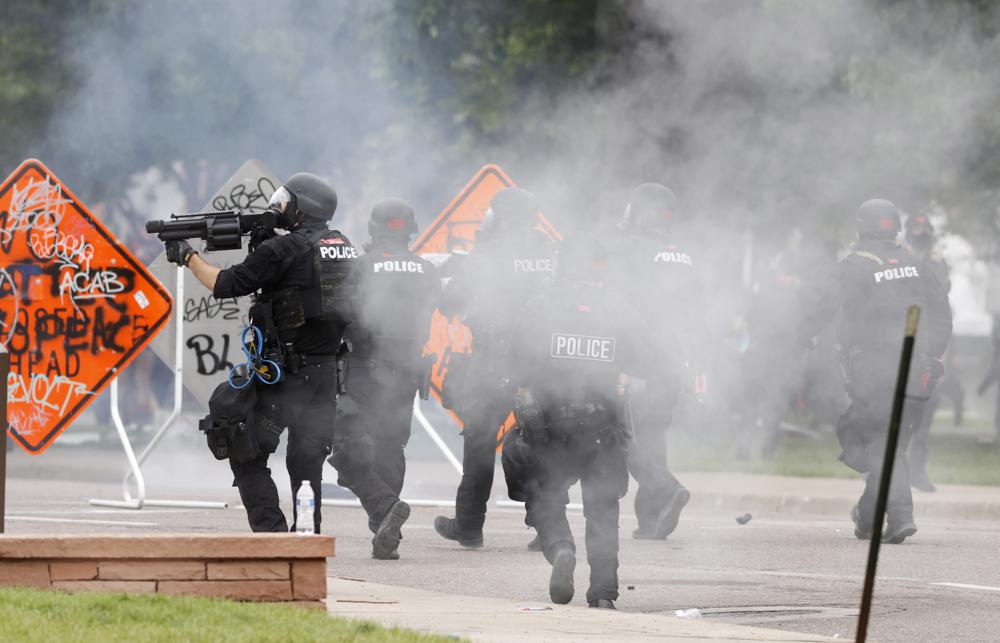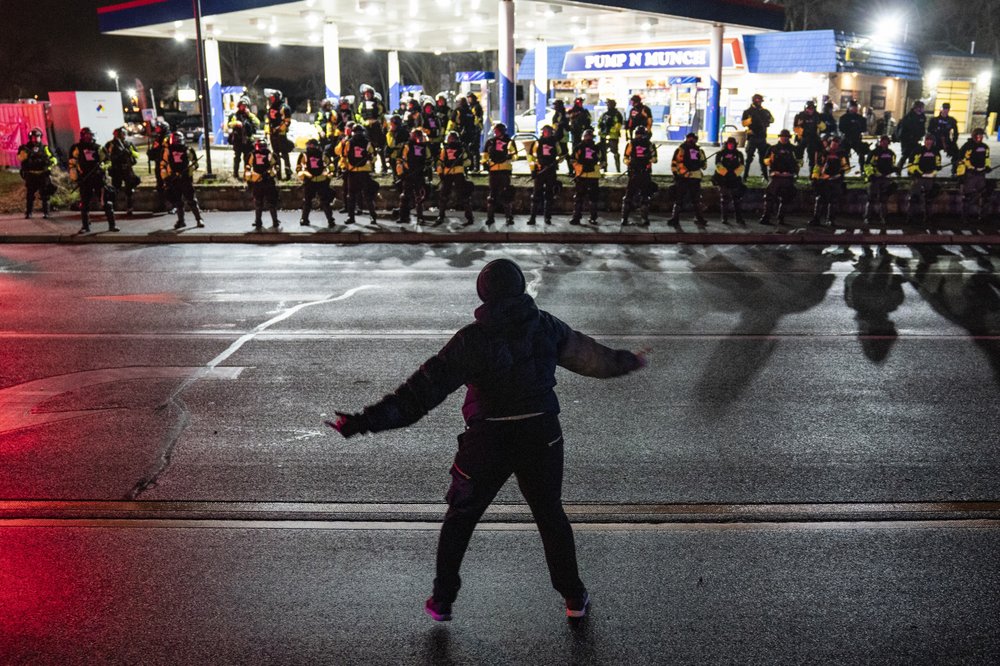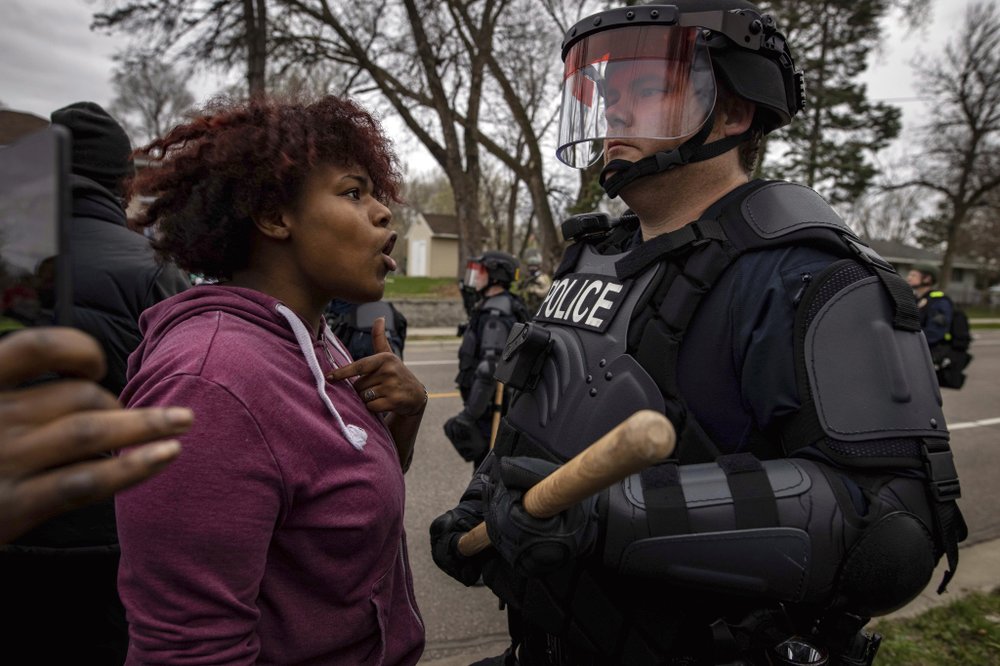Written by AMY FORLITI, STEVE KARNOWSKI and TAMMY WEBBER
The trial of a former Minneapolis police officer in George Floyd’s death is expected to turn toward the officer’s training on Monday after a first week that was dominated by emotional testimony from eyewitnesses and devastating video of Floyd’s arrest.
Derek Chauvin, 45, is charged with murder and manslaughter in the May 25 death of Floyd. Chauvin, who is white, is accused of pinning his knee on the 46-year-old Black man’s neck for 9 minutes, 29 seconds as Floyd lay face-down in handcuffs outside of a corner market.
Prosecutors say Chauvin’s knee killed Floyd. The defense argues that Chauvin did what he was trained to do and that Floyd’s use of drugs and underlying health conditions caused his death.
Floyd’s treatment by police was captured on widely seen bystander video that soon sparked protests that rocked Minneapolis and quickly spread to other U.S. cities and beyond. The video, plus officers’ body-camera video and previously unseen bystander footage, was a heavy component of the first week of the trial, reawakening traumatic memories for viewers of the livestreamed trial.
Police Chief Medaria Arradondo is expected to testify during the trial’s second week, perhaps as early as Monday. Arradondo, the city’s first Black chief, fired Chauvin and three other officers the day after Floyd’s death, and in June called it “murder.”
“Mr. George Floyd’s tragic death was not due to a lack of training — the training was there,” Arradondo said then. “Chauvin knew what he was doing.”
The city moved soon after Floyd’s death to ban police chokeholds and neck restraints. Arradondo and Mayor Jacob Frey have also made several policy changes, including expanding requirements for reporting use-of-force incidents and documenting their attempts to de-escalate situations even when force isn’t used.
Prosecutors have already called supervisory officers to build the case that Chauvin improperly restrained Floyd. A duty sergeant and a lieutenant who leads the homicide division both questioned Chauvin’s actions in pinning Floyd after officers responded to a report that Floyd had passed a counterfeit $20 bill.
“Totally unnecessary,” Lt. Richard Zimmerman, the longest-tenured officer on the force, testified Friday. He said once Floyd was handcuffed, he saw “no reason for why the officers felt they were in danger, if that’s what they felt, and that’s what they would have to feel to be able to use that kind of force.”
Zimmerman, who joined the department in 1985, said he has never been trained to kneel on someone’s neck if their hands are cuffed behind their back and they are in the prone position. Officers are supposed to get a person out of the position as soon as possible because it restricts their breathing, he said.
Instead, officers continued to restrain Floyd until an ambulance arrived — even after he became unresponsive.
Chauvin attorney Eric Nelson peppered Zimmerman with questions about the threat a handcuffed suspect might still pose, as well as whether handcuffs might fail. Nelson has also suggested that bystanders shouting at police might have distracted them from Floyd and made them feel threatened.
Jurors heard several days of testimony from those bystanders, several choking up as they recalled feeling powerless to help Floyd and guilt over his death.
Genevieve Hansen, an off-duty firefighter who came on the scene as she was out for a walk, said she immediately recognized Floyd was in trouble and tried to offer help. Instead, Officer Tou Thao ordered her to stay on the sidewalk. Hansen, who was mostly stoic while testifying, was overcome as she recalled her frustration.
“There was a man being killed,” she said. “I would have been able to provide medical attention to the best of my abilities. And this human was denied that right.”
Related Stories
‹

'The Floodgates Are Open': Duke Research Center Tracks Police Reform Bills in U.S.The topic of police reform has been high on the national agenda since George Floyd was killed three years ago. But what reforms are actually being proposed, and which of those proposals are actually getting enacted? Brandon Garrett is a law professor at Duke University who leads the Wilson Center for Science and Justice. Having […]

$14M Jury Award for Protesters Could Resonate Around USWritten by COLLEEN SLEVIN A federal jury’s $14 million award to Denver protesters hit with pepper balls and a bag filled with lead during 2020 demonstrations over the police killing of George Floyd in Minneapolis could resonate nationwide as courts weigh more than two dozen similar lawsuits. The jury found police used excessive force against protesters, violating […]
![]()
Tool for Police Reform Rarely Used by Local ProsecutorsWritten by MARTHA BELLISLE Isaiah Obet was behaving erratically and in mental distress in 2017 when Officer Jeff Nelson ordered his police dog to attack and then shot Obet in the torso. Obet fell to the ground and Nelson fired again, fatally shooting Obet in the head. The officer said his life was in danger. […]
![]()
Minnesota Shooting Charging Decision Awaited, Protests Go OnWritten by MOHAMED IBRAHIM and MIKE HOUSEHOLDER Prosecutors expect to decide Wednesday whether to charge a white former police officer who fatally shot a Black man during a traffic stop in a Minneapolis suburb, sparking nights of protests and raising tensions amid the nearby murder trial of the ex-officer charged with killing George Floyd. Brooklyn Center police officer […]

Protest After Chief Says Officer Meant To Use Taser, Not GunWritten by MOHAMED IBRAHIM and MIKE HOUSEHOLDER Police clashed with protesters for a second night in the Minneapolis suburb where an officer who authorities say apparently intended to fire a Taser, not a handgun, fatally shot a Black man during a traffic stop. Brooklyn Center Police Chief Tim Gannon described Sunday’s shooting death of 20-year-old Daunte Wright […]

Daunte Wright Death in Minnesota Traffic Stop Sparks UnrestA Black man died after being shot by police in a Minneapolis suburb during a traffic stop and crashing his car several blocks away, sparking violent protests that lasted into the early hours Monday as officers in riot gear clashed with demonstrators and the man’s mother called for calm. The man was identified by family […]
![]()
Expert: Lack of Oxygen Killed George Floyd, Not DrugsWritten by AMY FORLITI, STEVE KARNOWSKI and TAMMY WEBBER George Floyd died of a lack of oxygen from being pinned to the pavement with a knee on his neck, medical experts testified at former Officer Derek Chauvin’s murder trial, emphatically rejecting the defense theory that Floyd’s drug use and underlying health problems killed him. “A healthy person subjected to […]
![]()
Minneapolis Officers Line up To Reject Chauvin’s ActionsWritten by AMY FORLITI, STEVE KARNOWSKI and TAMMY WEBBER The parade of Minneapolis police officers rejecting a former officer’s actions in restraining George Floyd continued at his murder trial, including a use-of-force instructor who said officers were coached to “stay away from the neck when possible.” Lt. Johnny Mercil on Tuesday became the latest member of […]
![]()
Police Chief: Fired Cop Broke Policy in Pinning FloydWritten by AMY FORLITI, STEVE KARNOWSKI and TAMMY WEBBER The Minneapolis police chief who called George Floyd’s death “murder” soon after it happened testified that Officer Derek Chauvin had clearly violated department policy when he pinned Floyd’s neck beneath his knee for more than 9 minutes. Continuing to kneel on Floyd’s neck once he was handcuffed […]

Trial in Floyd’s Death Expected To Turn To Ex-Cop’s TrainingWritten by AMY FORLITI, STEVE KARNOWSKI and TAMMY WEBBER The trial of a former Minneapolis police officer in George Floyd’s death is expected to turn toward the officer’s training on Monday after a first week that was dominated by emotional testimony from eyewitnesses and devastating video of Floyd’s arrest. Derek Chauvin, 45, is charged with murder and […]
›





